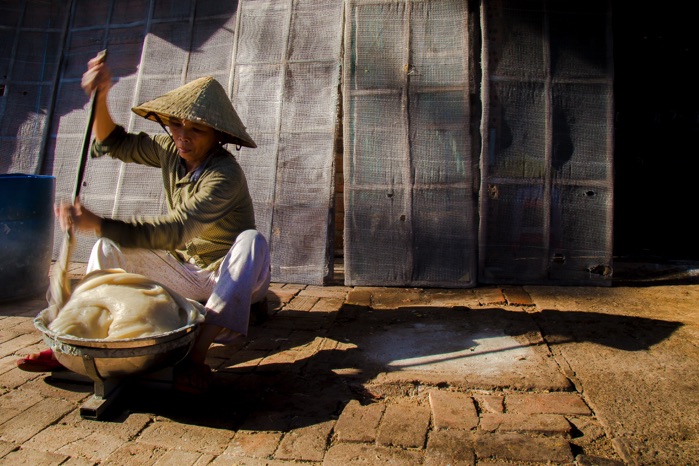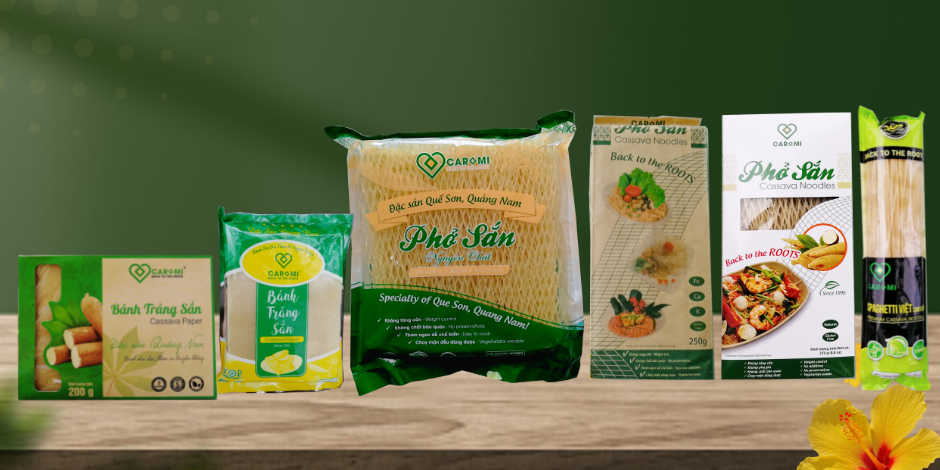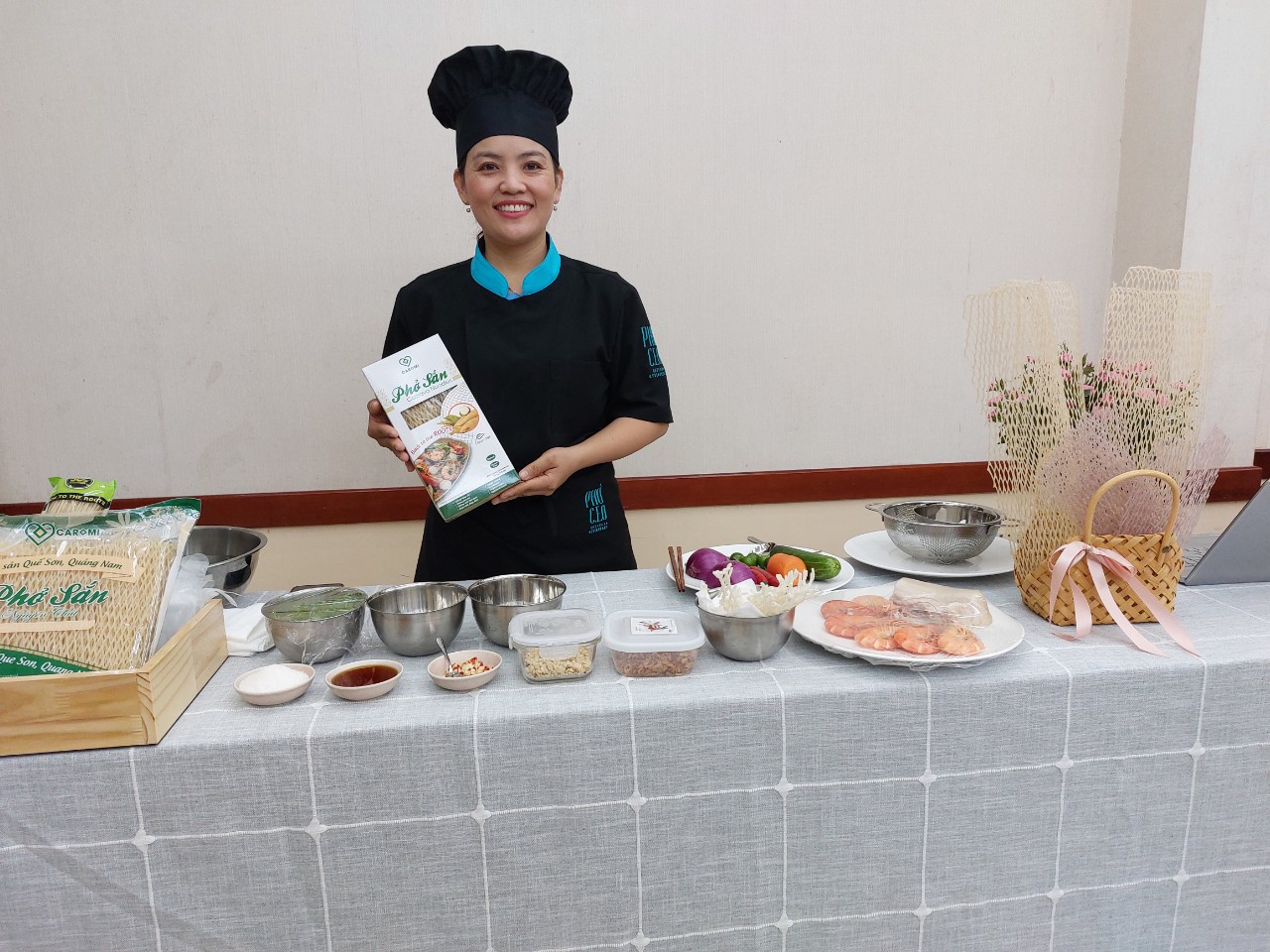When mentioning Quang Nam, many people immediately think of the famous Quang noodles or Cao Lau, known as “Hoi An specialities”. But it would be a pity if the name Cassava Noodles was not mentioned, because it is a unique dish that many people remember. This special cassava pho is proudly introduced by Mrs Le Thi Kim Anh as “the most beautiful noodles in Vietnam”, originating from Dong Phu town, Que Son district, Quang Nam.
It’s called cassava noodle simply because the noodles are made from a special ingredient, cassava tubers, grown in the Que Son area, where the soil is barren and rocky, and only cassava can survive. The cassava noodles are not formed into a flat and long shape like common Pho we usually eat, but are woven into a griddle-shape that looks very strange. And, of course, there are many steps involved in making this pho.
When times were good, all the households in the village made cassava noodles. By 2017-2018, the artisanal village had decreased, with only 2-3 households maintaining production and in a state where they could stop at any time. There are many reasons for the change, typically the work is too hard, tedious, has no output, is dependent on the weather and the environment, and people who work for profit still cannot survive in the job. Anh grew up thanks to cassava pho, became a successful student and business owner. When he saw that the craft village was in danger of disappearing and that there were no young people to take its place, Anh and her colleagues decided that they had to do something to help: restore the artisan villages and preserve the traditional crafts of their homeland.
Vietnam’s agricultural industry produces nearly 10 million tonnes of cassava per year, but cassava farmers’ incomes are very unstable and seem unable to be reinvested in sustainable farming, leading to soil degradation and erosion. This has led to factories that are already causing huge pollution. After learning about the outstanding properties of cassava, Anh was sure that she could go further with products made from this tuber, and the Caromi cassava pho project was born.
Throughout the implementation process, Anh and her team have researched and innovated to ensure that the production process does not pollute the environment. The project has linked up with cassava farmers, ensuring stable production and good prices. At the same time, the project is helping to develop craft village, increasing income by providing techniques, inputs and ensuring output for noodle makers. Each year, Caromi participates in about 20 fairs within and outside the province, organising more than 10 free tasting and experience events in a system of shops and supermarkets. Here, Caromi’s house samples have been enthusiastically received by customers.
Caromi’s cassava noodle and cassava rice paper products meet HACCP standards (Hazard Analysis and Critical Control Points – an international standard for quality management systems that helps businesses and organisations control and limit hazards that arise in food production and processing) and are recognised as OCOP products of Quang Nam Province (cassava noodle: 4 stars, cassava rice paper: 3 stars). In addition, Caromi also won a number of startup awards, such as the second prize for presenting startup ideas to international investors SURF Da Nang 2018, the first prize in the search for startup talent in the South Central Coast region and Central Highlands.
Through the knowledge and experience gained from the programa, Anh realised that focusing and diversifying by combining online and offline channels in parallel is a prerequisite factor in the company’s strategy. Previously, cassava noodle was mainly consumed in Que Son district. After 4 years of launching the product, Caromi products are now sold in more than 30 healthy food stores in Da Nang, Ho Chi Minh City, Hanoi and Binh Duong. Caromi has been introduced into the Winmart, Coopmart and Big C supermarket franchises. The company also has online agents and reputable e-commerce platforms. In addition to distribution through channels, Ms Anh has also tested the experiential tourism method: partnering with a travel company to open a tour to experience how to make handmade cassava pho and enjoy cassava pho right in Hoi An; partnering with a famous chef to introduce cassava noodle on television and bring it to major restaurants and hotels.
Currently, the company’s main product lines are Original cassava noodle (400g) and cassava rice paper(150g). These two product lines account for 80% of Caromi’s sales. Especially for the cassava rice paper products, the repeat purchase rate is up to 95%. At present, Caromi has a large number of loyal customers who use cassava rice paper, and the quantity purchased each time is equivalent to that of wholesale customers.
According to Anh, Caromi’s future direction is to build a solid distribution channel and get its products into more high-end restaurants and hotels. At the same time, it will develop new products to meet domestic and international culinary needs, with the aim of exporting to major countries. Currently, Caromi is collaborating with Da Nang University of Science and Technology to research seasoning packages for instant cassava noodle and Quang noodles in the form of ready-to-cook products, which are expected to be launched in 2024.
The success of Caromi Joint Stock Company with its cassava pho and other cassava products has opened up a new direction in preserving and promoting Quang Nam’s indigenous culture and enhancing the brand of local products. and gradually conquering the most demanding diners from many places.




